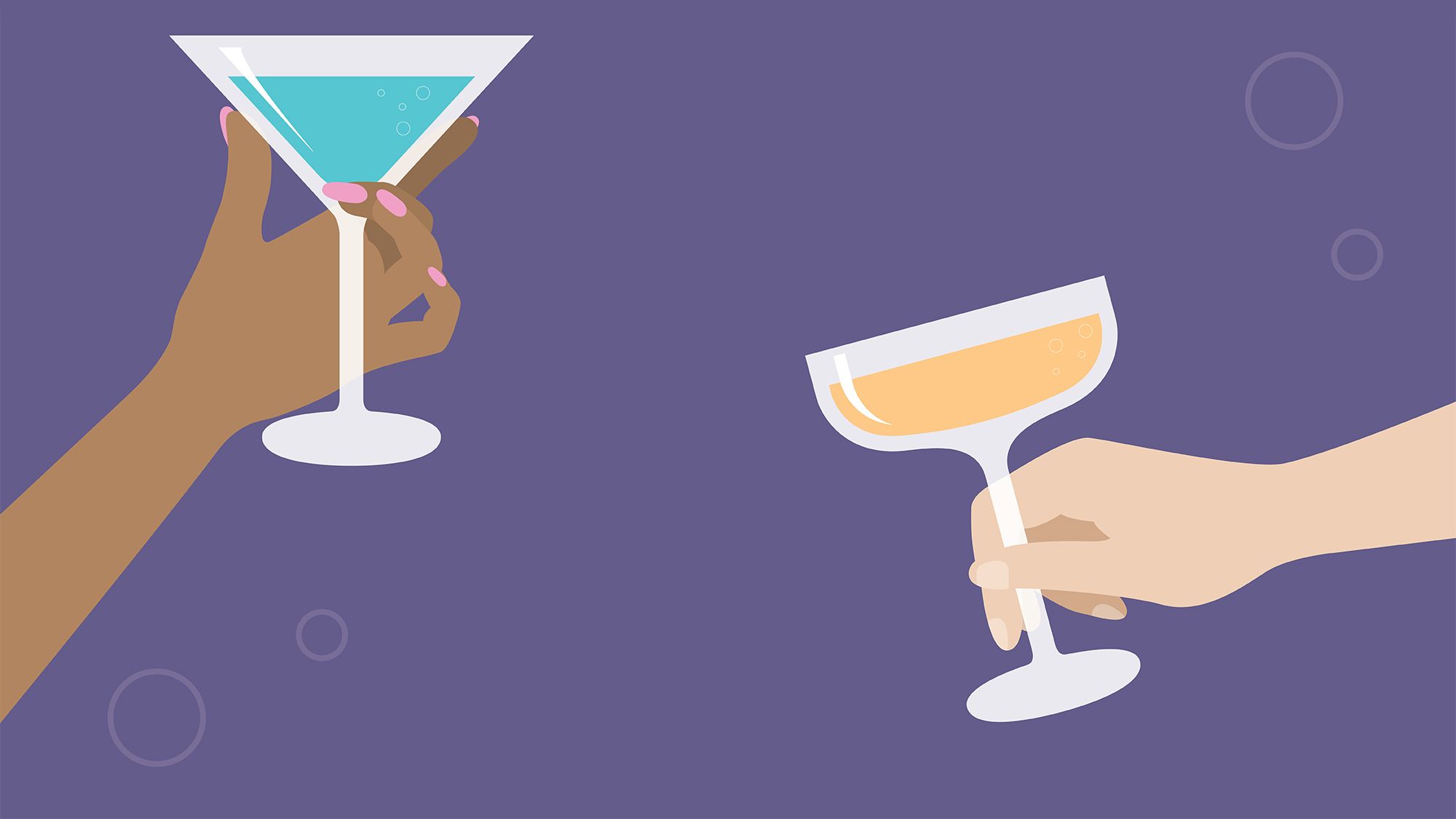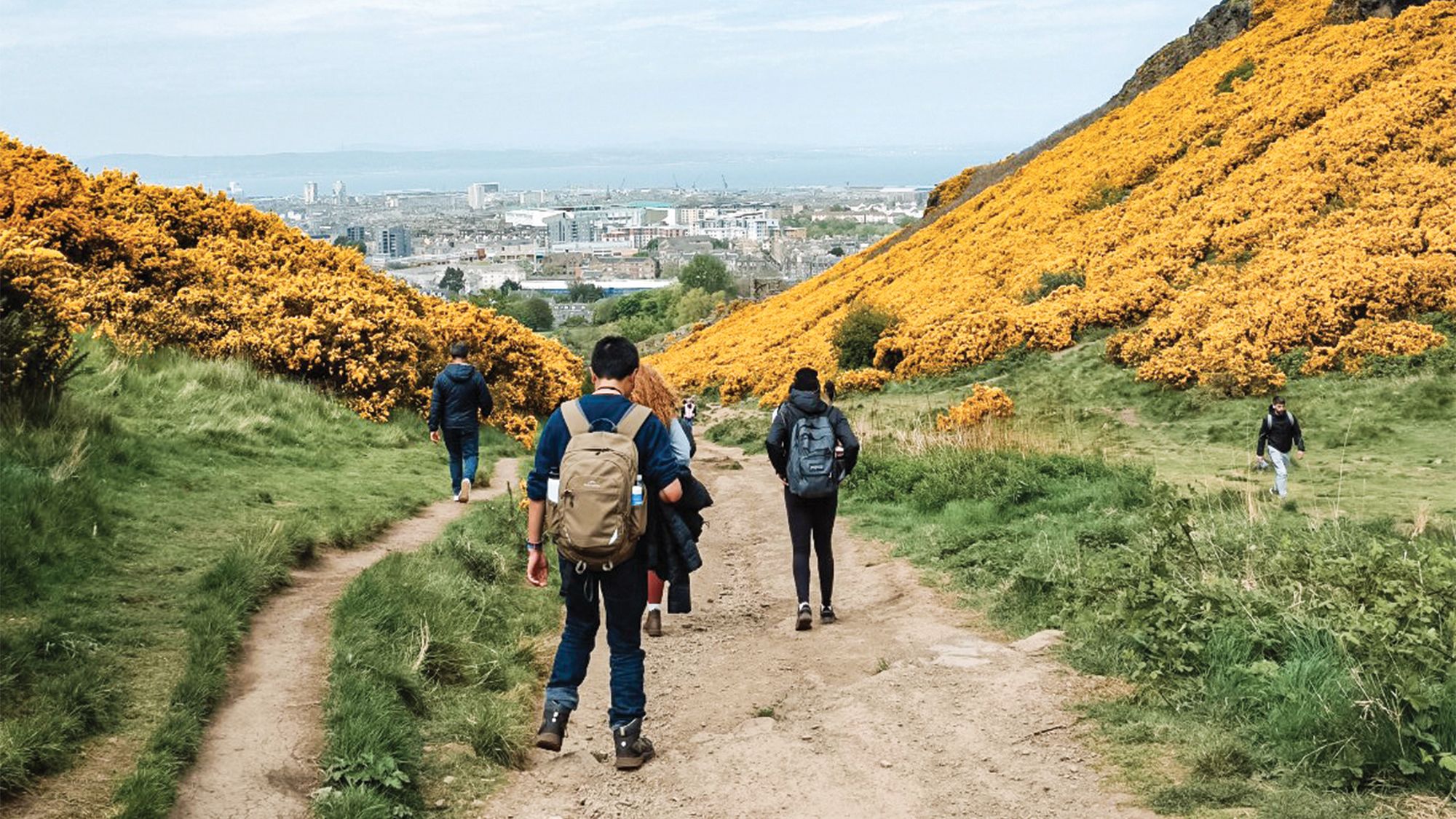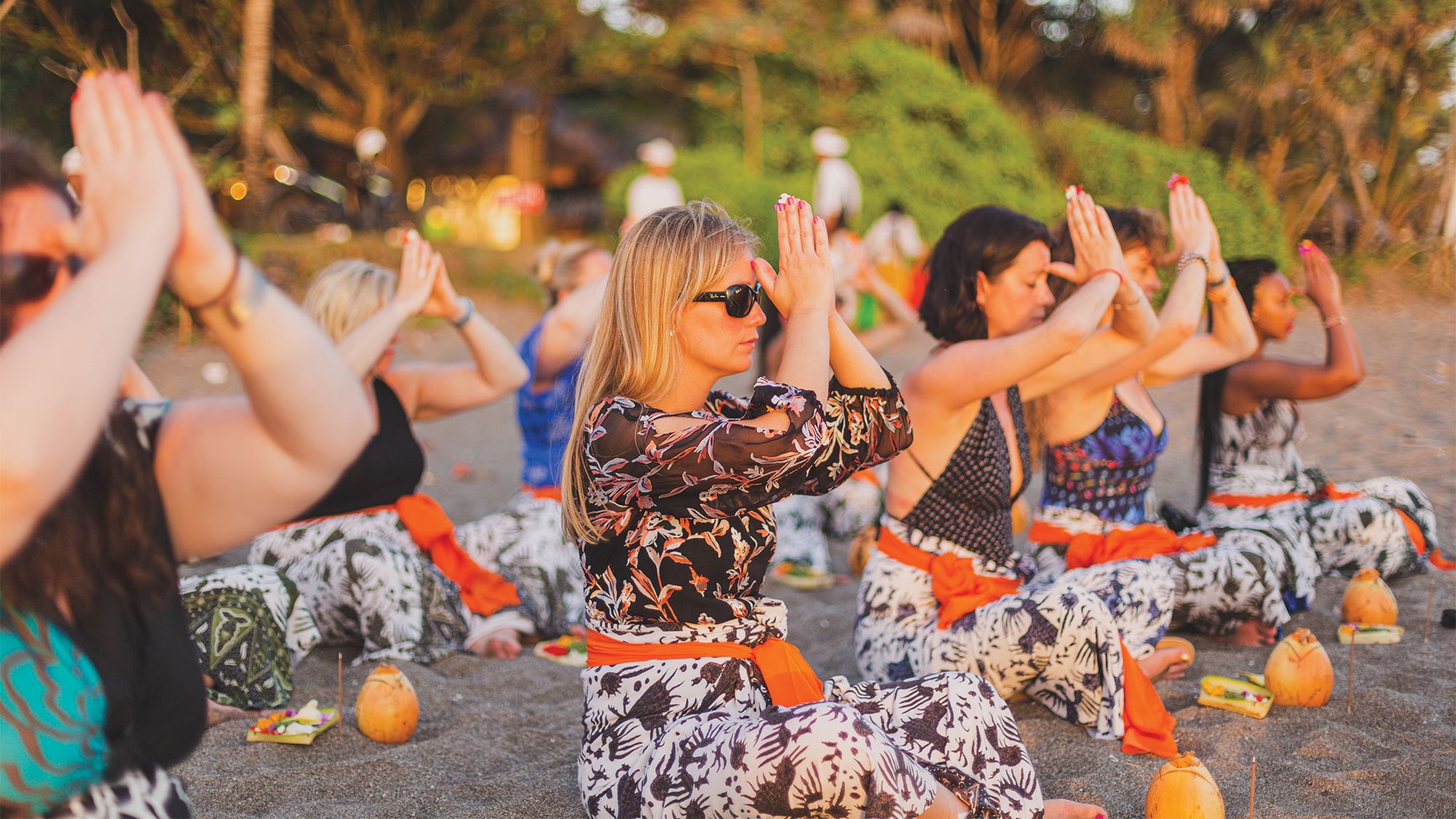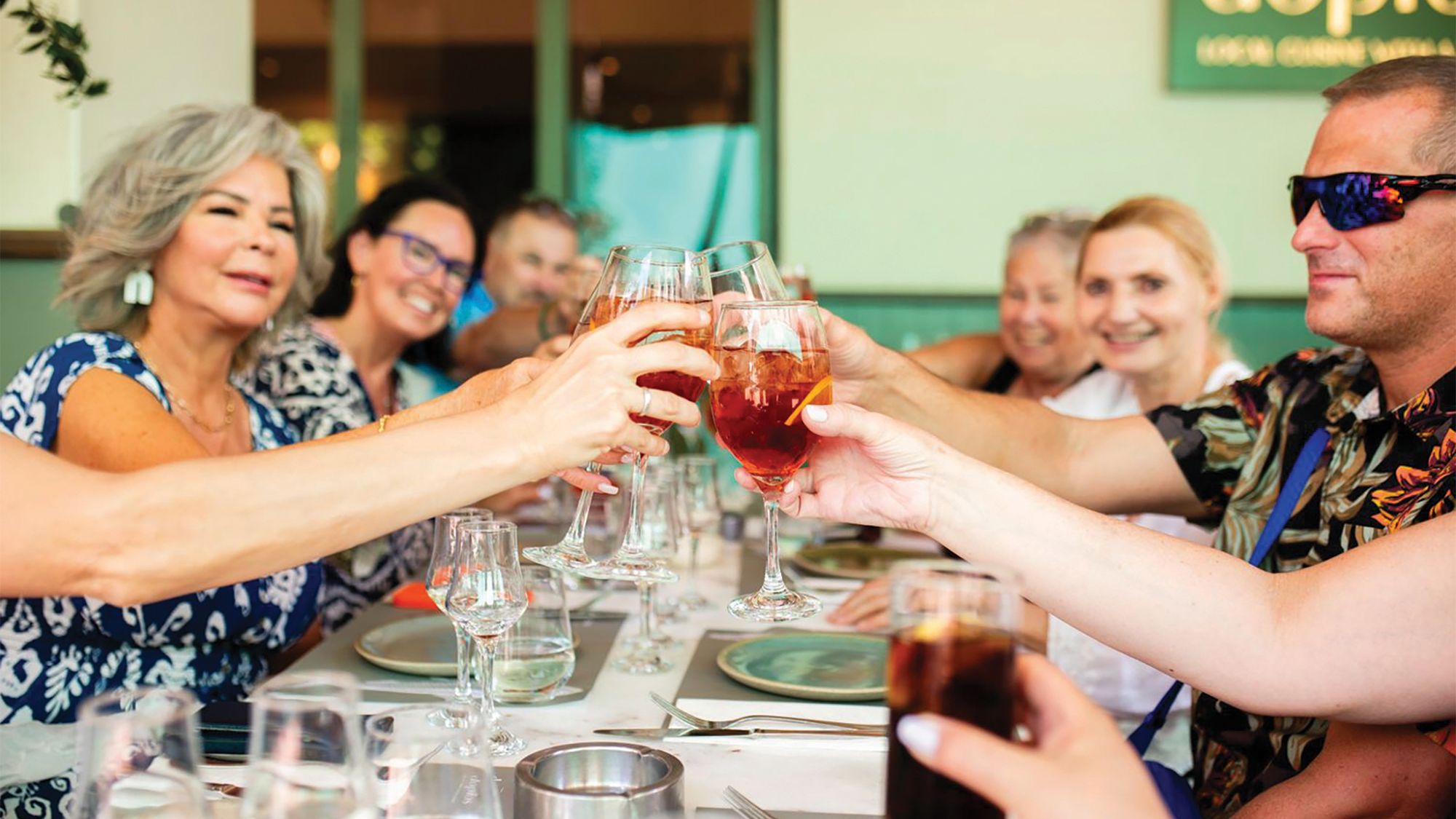Growing thirst for sober travel
With drinking habits changing among younger people, tour companies are adding alcohol-free itineraries to their trip menus.
Illustration by Jenn Martins
Illustration by Jenn Martins
In 2024, Contiki, the Travel Corp. brand that caters to 18- to 35-year-olds, made a startling discovery: 83% of respondents to its Voice of a Generation survey of Gen Z and millennials in the U.S. were interested in booking “sober experiences.”
Responding to that thirst for alcohol-free travel, Contiki launched six trips geared toward the sober-curious, departing in Britain and Ireland in late August.
So far, the tours are outperforming some standard itineraries, surprising even some Contiki executives.
“The interest has shocked me and blown my mind a bit,” said Lottie Norman, chief marketing officer for TTC tour brands, including Contiki.
Contiki is not the only tour provider responding to the shake-up of drinking habits among younger generations.
Research from Gallup shows that younger adults are drinking less than they did 20 years ago: A 2023 survey found that 62% of responding adults age 18 to 34 drink alcohol, down from 72% two decades ago. The percentage of “regular drinkers,” those who had an alcoholic beverage in the past week, dropped from 49% to 38% in that age group.
This generational shift has led to the rise of the “sober-curious,” a movement that is not about abstaining from alcohol entirely but encouraging a moderate and mindful approach to drinking.
Those changing attitudes around alcohol have prompted tour operators to raise the bar with itineraries that highlight the buzz around alcohol-free offerings.
Alcohol-free tours are growing in popularity beyond niche specialists and those that cater to people in alcohol addiction recovery. These tour operators say that sober-curious travelers crave the same adventures that their drinking counterparts experience, and in the same destinations.
That was part of the reason that Contiki chose Britain and Ireland, destinations where bars and distillery tours are an important part of the travel landscape.
“Instead of spending evenings drinking in the pub, you’ll watch magic shows, take part in baking classes, indulge in farm-to-fork dinners and so much more,” the Contiki website promises.
Or as Norman put it, it’s about going “against everything you thought you knew about these destinations.”
And removing the expectation of drinking can also spur deeper connection among travelers who are eager for adventure sans hangover, she said.
Norman said she believes that interest in alcohol-free tours is not a fleeting travel trend but a lifestyle kick-started by the younger generations. The company began observing the rising interest in sober travel over the past 24 months, she said, and has come to see sober curiosity not as an anti-alcohol movement but one that originates from a mindfulness and wellness perspective that focuses on balance and moderation.
“We recognize that Contiki is recognized for having fun,” Norman said, adding that alcohol-free itineraries could expand to other TTC brands. “This is about offering more choice and ensuring every traveler has a trip that suits their lifestyle.”
Contiki — which offers trips for younger travelers, like this one in Edinburgh, Scotland — is rolling out trips for the sober-curious this fall to Britain and Ireland. (Courtesy of Contiki)
Contiki — which offers trips for younger travelers, like this one in Edinburgh, Scotland — is rolling out trips for the sober-curious this fall to Britain and Ireland. (Courtesy of Contiki)
Pouring over the data
Although young people are leading the sober-curious charge, the desire to drink less resonates with adults of all ages. Research from NCSolutions, a data and consulting firm, found that nearly half of Americans want to drink less this year.
Lee Thompson, co-founder of Flash Pack, a tour operator that specializes in solo travel, has found that interest in alcohol-based activities is waning among his clientele.
About 40% of Flash Pack guests have shared that they don’t drink often and that alcohol just isn’t that important to them, he said, marking a shift from when the company was founded a decade ago and craft cocktails were all the rage.
Thompson said his American clients are driving the change, prompting Flash Pack to audit its itineraries and pull back on alcohol-based excursions. Thompson himself said he has stopped drinking, joining those who are “looking after their health more and drinking less.”
Flash Pack debuted alcohol-free tours this year, with two departures to Bali. Unlike Contiki’s attempt, those trips did not perform as well as the company had hoped, but Flash Pack is still pulling back on the alcohol on all trips.
“It’s gone from a sober-specific departure and evolved into a ‘let’s be really conscious and have loads of activities that don’t involve alcohol,’” he said, adding that Flash Pack is making an effort across all trips to have nighttime activities that aren’t alcohol-focused, like a nocturnal tour of the Amazon in Peru and searching for hippos on an evening in Tanzania.
The shift in offerings aligns with Flash Pack’s approach to itinerary curation, which focuses on “social travel” and the goal of creating 1 million friendships. By the company’s estimate, its trips have so far led to 100,000 friendships, with 80% of past travelers keeping in touch.
And while Thompson said there is more need to connect and make new friends now than ever before, the increased focus over the past couple of years on mental health has seen people realize that “the quality of their connections is the single most important thing for your mental health, but then it’s closely followed by what you’re eating, what you’re drinking, how you’re looking after yourself.”
Another mainstream tour operator to serve up alcohol-free options is EF Ultimate Break, which, like Contiki, curates trips for younger travelers. EF surveyed more than 1,000 Gen Z and Millennial travelers and found that 68% of 18- to 22-year-olds wanted sober experiences while on spring break, leading the company to launch three alcohol-free trips debuting next year.
“Our sober trips pack all the social vibes and adventure, from home-hosted cooking classes to Muay Thai boxing matches,” the company promises sober-curious travelers. “Hang with other college-age travelers who know good times don't need alcohol and make memories together that reset your mind, body and soul.”
EF will take travelers to Costa Rica, Thailand and Egypt. Instead of chugging guaro sours in Costa Rica, EF asks travelers to imagine “sipping the best coffee you’ve ever had, right at the source.” The Thailand trip will feature wellness activities, like massages and relaxing on the beach. The Egypt itinerary, which focuses on exploring the ancient wonders of the country, includes alcohol-free drink suggestions, like karkadai tea, Mowz bil-Laban and sahlab.
Flash Pack developed an alcohol-free itinerary to Bali and is adjusting its other itineraries to not be as heavily focused on drinking. (Photo by Connor McCracken/Flash Pack)
Flash Pack developed an alcohol-free itinerary to Bali and is adjusting its other itineraries to not be as heavily focused on drinking. (Photo by Connor McCracken/Flash Pack)
Uncorking alcohol-free travel
Alcohol-free travel specialists We Love Lucid and Hooked Travel have offered dry trips since their launches.
We Love Lucid founder Lauren Burnison stopped drinking in 2016 while living in South Korea and found that, at the time, trip options for alcohol-free group travel were lacking, with the options mostly for people in recovery.
“The vision that I had was to create something life-affirming, invigorating,” she said, a desire that led to the launch of her company in 2019.
Since then, Burnison’s company has brought like-minded travelers to Spain, Scotland and England, where instead of sangria or pints, the group has dabbled in canyoning or river tubing. That’s not to say beverages aren’t featured: travelers have tested alcohol-free gin, kombucha and mocktails.
We Love Lucid is offering two trips this year: cycling from Beer to Soberton (two real villages in England) and a women’s hiking trip on the Camino de Santiago in Spain.
Hooked Travel was also born from the founder’s relationship to alcohol. Darci Murray, who no longer drinks, founded the company in 2021 and launched her first boozeless trip to Iceland the following year.
Decentering alcohol can broaden connection and experiences, Murray said, adding that travelers on her tours aren’t going to stop exploring at 4 p.m. sharp to sip on a happy hour cocktail.
The company is leading what Murray said is the world’s first alcohol-free wine tour in May, which will take travelers to four German vineyards where they will sample dealcoholized wine. Hooked already has a 2026 “dry” wine tour slated for Australia.
Winery tours for nondrinkers? Yes, Murray said, because alcohol-free travelers want to immerse themselves in “normal travel places.”
When Murray launched Hooked, she wanted to take a group to Morocco, where alcohol is limited due to religious reasons but struggled to get the trip off the ground due to lack of interest. That’s when she held a focus group at an alcohol-free bottle shop and discovered that nondrinkers simply “want inclusion.”
Hooked also launched the Dry Grad collection of tours, which Murray said removes the pressure of drinking for younger adults who might otherwise feel like they have to imbibe to fit in. The idea was born after Murray’s son graduated high school and she brought him with her while leading a trip to Italy. Her son’s friends wanted to join, and because the trip was alcohol-free, their parents “couldn’t send the text [saying yes] fast enough,” Murray said.
The first official Dry Grad trip, geared toward high school- and college-age travelers, is heading to Thailand in July and promises to “remove the alcohol and make travel a safe environment for our youth.”
Travelers on a Hooked Travel trip to Greece toast with their nonalcoholic beverages. (Courtesy of Hooked Travel)
Travelers on a Hooked Travel trip to Greece toast with their nonalcoholic beverages. (Courtesy of Hooked Travel)
Tapping a growing market
Tour operators aren’t the only ones putting a cork in their alcohol offerings.
The global nonalcoholic beverage market, now valued at $1.8 trillion, is expected to reach $3.8 trillion by 2034. Although this includes beverages like soda and tea, the boom is credited to growing consumer interest in healthier drink choices.
International Wine and Spirits Record data showed growth in the U.S. nonalcoholic segment and is on track to continue growing, with nonalcoholic beer and cider up 29% in 2023 over the previous year.
Gone are the days of choosing between a virgin screwdriver or a Shirley Temple. The hospitality industry is mixing it up with mixologists putting as much care into mocktails as they do cocktails. Zero-proof alcohol is on display in bottle shops, restaurants and even boozeless bars like Hekate Cafe & Elixir Lounge, New York’s first sober bar. And whether at hotel bars, on cruise ships or in theme parks, tourists are more likely than ever to find zero-proof options to enjoy.
Even vineyards and breweries now have a place for the spirit-free drinker.
Napa’s Bardessono Hotel & Spa last year introduced an N/A-pa Concierge, calling it the first of its kind in Napa Valley, who crafts itineraries that spotlight the region’s vast offerings for the “free-spirited” traveler, such as mocktail menus and olive oil tastings. A handful of vineyards on Long Island’s North Fork have debuted nonalcoholic wine, including Wolffer Estate, which has six alcohol-free varietals. Wineries in the Finger Lakes region of New York offer fancy grape juice, root beer and craft soda.
Norman said travelers “know that the value of travel doesn’t need these alcohol-fueled experiences. It’s about connecting and the experiences and learning things.”




